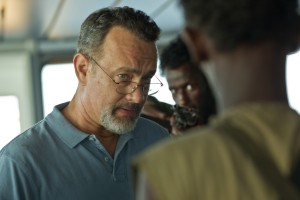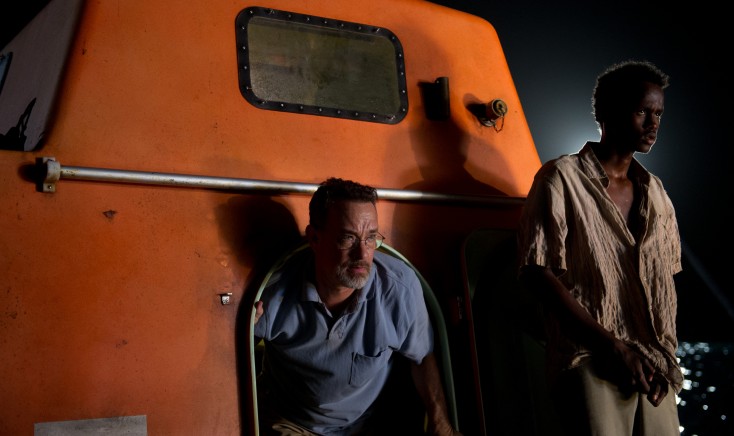
Tom Hanks stars in Columbia Pictures’ “Captain Phillips.” ©Columbia Pictures Industries. CR: Hopper Stone.
By ANGELA DAWSON
Front Row Features
HOLLYWOOD—Tom Hanks is used to playing heroes onscreen but the two-time Oscar winner doesn’t consider himself a hero in real life.
In the action thriller “Captain Phillips,” the beloved actor plays Richard Phillips, a merchant ship captain who saved his crew from being slaughtered by keeping his cool when Somali pirates attacked his unarmed cargo ship in the Gulf of Aden in 2009.
Hanks, most recently seen in the sci-fi drama “Cloud Atlas,” and who depicts Walt Disney in the upcoming “Saving Mr. Banks,” spoke about playing a real life sea captain who survived several days of intense duress using his best negotiation skills and survival instincts to try and defuse the situation. He was buoyed by his commitment to his crew as he awaited rescue by the Navy.
The intense, action-packed film is based on Phillips’ book, “A Captain’s Duty: Somali Pirates, Navy SEALs, and Dangerous Days at Sea,” and directed by “The Bourne Supremacy” director Paul Greengrass. Billy Ray (co-writer of “The Hunger Games”) wrote the screenplay.
The 57-year-old actor recently spoke about playing Phillips, getting to know the real man and his definition of heroism.
Q: Did you spend any time with Captain Phillips?
Hanks: I did. I read his book actually, prior to reading the screenplay, and I did get together with him on two occasions, and explained to him, “I will say things you never said and will be places you never were, but if we do this right, thematically, we will be spot on,” with the nature of what happened to him and how. It’s a very environmental movie. Shooting it as we did, on board more-or-less an identical ship to the Alabama, at sea or in very small confines. So the task of folding ourselves into Paul’s good hands is always to be true to the motivations of everybody that was involved. For the sake of storytelling, if you start manufacturing moments that truly were not part of the five or six day (ordeal), then I think you can get into trouble. I could probably walk you through this and say, “That’s a moment that didn’t happen exactly, but thematically it is what happened.” That’s tricky and it can get away from you, but we were always searching for that combination of procedure and behavior that were going to be not just reminiscent, but very reflective of what really happened. That’s tough, when you’re selling non-fiction entertainment.
Q: Did you feel claustrophobic on the lifeboat?
Hanks: I’m not a particularly claustrophobic person, but it was a very small space. There was no other way to do it. We built the exact replica and put it on a gimbal, and that’s where we shot. Environmentally, it does a lot of the work for you. It’s a very uncomfortable space. It smells horrible. The air is bad. It’s hot. And you are right on top of each other. There are a lot of places to bonk your head and crack your knee. We all did that. Everybody had all sorts of various scars. And we were in there for a very very long time. But Paul (Greengrass) sets up an environment that is very realistic and I can’t imagine doing it any other way. There’s ways that may have been more pleasant but for everything we needed to go through as actors, that tiny hot cramped place with only two little windows on it was a great advantage for us.
Q: What did you learn from Barkhad Abdi, who plays the pirate leader Mace in the film?
Hanks: The four guys—Mahat Ali, Faysal Ahmed, little Barkhad (Abdirahman) and big Barkhad (Abdi)—achieved something that often is proven again and again. There are a small percentage of people who can (act). There’s a small percentage (of professional actors) who get to do this for a living. There’s a swath of the population that are able to keep a story in their head and fight all the battles against self-consciousness and the surreal unnaturalness of acting in a movie. The technical aspects you can learn fairly quickly. But that other aspect of inhabiting a character and staying on story and on point while maintaining that character is not something everybody can do. These guys—particularly Barkhad (Abdi)—were able to do this from the get-go. Even though there was a true terror in the eyes of all the white guys when they came aboard the ship, when they came onto the bridge (for the first) time, what transpired after that had to go beyond any artificial trickery. They had to get up and deliver the goods. The fact that they did, through the course of the entire movie, is a testament to the power of creative artists.
Q: Has your definition of manhood changed over the years playing heroes?
Hanks: You mean faking being a hero?
Q: Yeah, from “Splash” until now?
Hanks: (sarcastically) Heroic parts, every one. No, I’m just a guy who’s got a pretty good gig pretending to be other people. “Hero” is almost like a branded term now. It’s bandied about all the time. People get labeled it left and right. In the end, heroes are ones who voluntarily walk into the unknown and try to do the right thing. It’s all relative. Everybody has variations of it. Sometimes it’s death defying and sometimes it’s just living up to one’s responsibility. The work that I have done has not been more impactful in my concept of trying to do the right thing than the examples that are evident every day that you see in the news media and the common things that people do that I end up admiring. Richard Phillips (the captain) doesn’t view himself a hero. He was a guy who sat there and waited for the heroes to show up, which is different. We all have times in our lives where we can either be a hero, a villain or a coward and I just hope that I’m a coward as little as possible, and hopefully never a villain and on the occasions when I have to be, I would hope to be able to do the heroic thing, but I’ve never been tested in any way, shape or form—other than facing down members of the fourth estate. That’s a joke, c’mon.
Q: Did you put yourself in Phillips’ place and think about your family when you made this?
Hanks: There are times in your work where you do that, but after a while that well has been gone to a few times too many, and it has to be more an empathetic reaction to the actual people. I got to know Rich a little bit. I don’t have anything in common with Rich. I love my family, I love my kids (but) when the moments come, it’s not as though you can just substitute your own life with what you’re doing on film. You have to go to some other place where it’s bigger than your own life. And it has more impact than that. I don’t know how to explain the process and I certainly wouldn’t, but it’s not merely thinking about my wife and my kids, and what would I do in these situations. It requires being open to a bigger, holistic vision of what the story is, as well as the truly tactile experience of what we’d been through over the course of making the movie. Early on (in my career), when I wasn’t 57 years old, when I hadn’t done that much or seen that much, yeah, I would say I would turn to images of my family quite a bit in movies, in the work that I did. But as time goes by, you’ve got to see it in a broader picture than just your own personal world. You’ve got to look at the bigger world and be a part of that.
Q: How do you compare the emotional anguish of this character versus other characters you’ve played like in “Cast Away” and “Philadelphia?”
Hanks: Every movie is completely different. I wish they would relate one to the next but they don’t. It would be a nice shorthand if they did. But (with each film) you start all over from square one. Everything you’ve done in the past means absolutely nothing. You’ve just got to trust your process and everything you’ve learned in the course of doing the next one.
Q: You’ll have three films out by year’s end. You’ve been quite busy.
Hanks: I’ve got to get out of this racket; it’s killing me.





